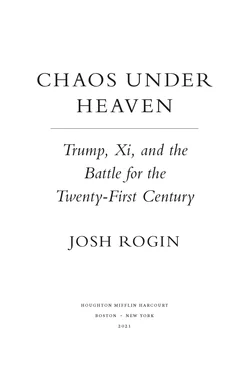In January 2016, Kim had given the number two position at the World Bank to a Chinese official named Yang Shaolin, a former Chinese finance ministry official who had served as China’s representative at the bank for several years, reportedly in response to a personal request by Xi. Yang’s title was managing director and chief administrative officer, a new position that didn’t exist before, and with a broad mandate that gave him general control over the budget of the World Bank. The human resources staff and the information technology department also reported up to him.
While Kim was president, other top bank officials from China included Wei Wang, the head of “human resources business partnerships,” and a man named Jin-yong Cai, who had been the CEO of the International Finance Corporation (IFC) and was known for helping Chinese state-owned enterprises get business in developing countries.
When Cai took over the IFC in 2013, European journalist Elliot Wilson wrote, “Cai knows China inside and out. He has strong contacts at key regulators and ministries, and within the all-powerful grouping of state-owned enterprises, and his logical career progression, post-IFC, will surely be as a member of China’s political elite.”
Cai stepped down from the IFC in 2015 along with Kim’s CFO, Bertrand Badre, amid a scandal over their involvement in an unusually structured $1 billion Chinese loan to the World Bank’s development fund. Cai landed at a private equity firm called TPG Capital, but he remained close with Kim and spent lots of time with him at the World Bank. TPG wanted to raise billions of dollars from Chinese investment. He didn’t last long before leaving the firm.
Two months after his speech in Beijing, Jim Kim abruptly quit his job as president of the World Bank with barely an explanation. He took a job within days with a firm called Global Infrastructure Partners, which was a private equity fund heavily involved in projects related to BRI. Four months later, Global Infrastructure Partners hired Kim’s friend Cai to work with him there.
Kim’s philosophy, that it was the World Bank’s job to help China succeed economically, could arguably have fit into the Obama administration’s basic approach, which was to engage with China economically as much as possible. But by 2018, this was counter to US policy. More importantly, the information coming out of Xinjiang showed the truth of how China’s development policies were being implemented—with no regard for the rights of the people in the way of the projects or the environment they lived in.
And although Kim, as World Bank president, had to consider the interests of lots of different stakeholders, including China, on his watch China was the bank’s number one recipient of aid as well as the country whose companies received more World Bank contract money than any other nation.
Kim went out of his way to steer World Bank money into China and help China reap benefits from its exploits in the rest of the developing world. Why he did it, we can only speculate. But the fact that he is profiting from the Belt and Road Initiative he helped to push provides one explanation.
Vera’s Story
China’s efforts to co-opt the United Nations and other international organi zations to help its development plans were part and parcel of its drive to hide Chinese atrocities in Xinjiang. Foreign governments were threatened with losing lucrative deals if they dared speak up. Most Arab- and Muslim-majority countries looked the other way. But the issue gained traction in the United States because Beijing’s persecution of Uyghurs and other minorities affects Americans as well.
Hundreds of American citizens and permanent residents have family members in the camps. All twenty-six Uyghur reporters for Radio Free Asia, a US government media outlet that has been reporting on the situation, have family members who have been arrested or disappeared.
Sometimes the survivors come back to the United States and tell their stories. One of those survivors told her story to me. Her name is Vera Zhou.
On October 17, 2017, Zhou, a sophomore at the University of Washington in Seattle, was visiting her father in Xinjiang. She was scheduled to return to Seattle, where she lived with her mother, on the 25th. On the 23rd, she logged in to her school’s VPN to file her homework. At eleven o’clock that night, the police called her and asked her to come to the local police station right away. She arrived at midnight. The local officials wouldn’t say anything except that police from the nearby city of Urumchi were on the way. Three hours later, officials in plain clothes arrived and told her they needed to bring her back to Urumchi immediately.
“I asked them what this was about. They didn’t tell me anything. They just told me to get into their van. After I got in the van, they handcuffed me. No explanation. That’s when I started to cry.”
When they arrived at the Urumchi police station, the officials asked her some basic questions about her visit to China and whether she had used a VPN. She said she had, to submit her homework. They took her fingerprints, took her photo, and took a blood sample. At about eight in the morning, the police took her to the hospital for a more thorough checkup, handcuffing her for the ride. About four hours later, the lead official announced the verdict.
“He told me I had to go study at the relocation camp,” she said. Zhou received no other explanation. The authorities refused to answer any questions. She was allowed to call her father, but he didn’t pick up. They confiscated her passport and her US green card (she is a US permanent resident) and all of her other possessions. Two hours later, she was delivered to the camp, a three-floor prison building about thirty minutes outside the city center. Vera didn’t know anything about the camps before her arrest. She didn’t know the hell she was about to endure.
Vera was led to a small room with six bunkbeds and told to change into a prison uniform. There were two cameras in the room and a speaker, so the twelve women packed in there knew they were being watched twenty-four hours a day. Her father eventually was allowed to come to visit the camp for a fifteen-minute heavily supervised visit. He was too afraid of retaliation to say anything. That was the only time she saw him during her five-month imprisonment.
The women were only allowed to leave the room for “class,” where they would be taught simple Chinese and forced to sing patriotic CCP songs. They were never allowed to go outside. They got their meals by passing a plastic bowl out of the cell door to be filled with slop. Vera only left the building once, when she had to go to the hospital. She had recently had major surgery. Aside from that one checkup, though, she was not allowed the medical care that her surgery required.
One of the women in Vera’s room was still breastfeeding her baby when she was arrested, but they were separated. Some women had entire families imprisoned in the camp. One of Vera’s cellmates was a reporter for the Chinese state media but was a Uyghur. She was arrested because another Uyghur man the authorities deemed an extremist had been on her flight, completely unbeknownst to her. Once, by chance, that woman saw a group of men from the floor below pass by in the hallway and she recognized her father among them. That was how the woman discovered her father was also in the camp.
The women had to talk carefully. Prisoners were rewarded for snitching on each other, creating fear even among the cellmates. Vera wasn’t allowed to talk about her life in the West. None of the minority women were allowed to speak their native languages. The guards had a point system, where prisoners could earn the right to see or even have dinner with their families.
Читать дальше











